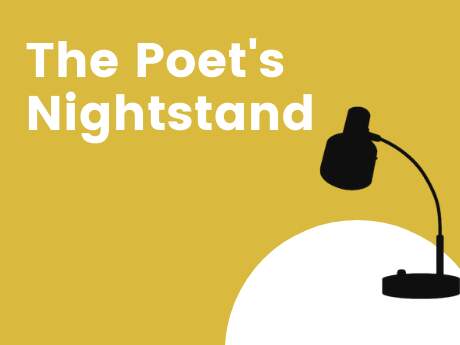The Poet’s Nightstand
The Poet’s Nightstand with Chet’la Sebree
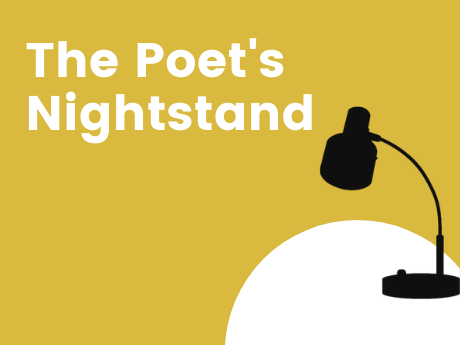
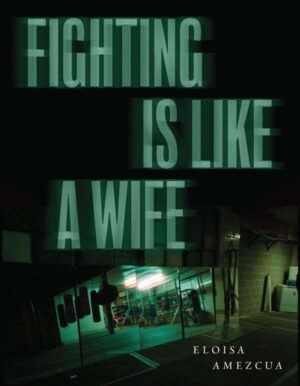
Fighting Is Like a Wife
by Eloisa Amezcua
Amezcua’s sophomore collection charts the life of boxer Bobby “Schoolboy” Chacon with his wife Valorie Ginn. In the poems, the division between the home and the ring dissolves as we embrace Chacon’s love of each round alongside Ginn’s pleas for him to leave boxing. In this collection, Amezcua has me on the ropes as I go round for round with the two lovers in a section-less book that keeps pressing me towards Valorie’s eventual death by suicide. Fighting Is Like a Wife is as visceral as it is tactile. I can smell the arena, feel the wet squish of fist on flesh, as I manipulate pages to parse meaning through visual poems that had me reading the book sideways and in circles. “Bobby v. Valorie” reminds me of how sense is a construction we must make for ourselves, as I followed line graphs to logic. These formally agile poems appear alongside ones written in traditional forms like the sonnet and pantoum. But even as I arrive at forms I know, Amezcua still keeps me on my toes as she bends and breaks the rules to suit the book’s needs—a sonnet appearing entirely constructed of the same line save for a slight change in the final one that fades in from grey to black (“Round 8)”. Poems like these, laden with echoes and repetition, mimic, for me, the disorientation of a boxed ear; remind me of poems like Harryette Mullen’s “Elliptical,” where there’s language at the periphery; force me to grapple with Chacon’s eventual dementia caused by repeated head trauma. The act of repetition in this book—which utilizes archives, interviews, and footage to map history—feels like a mental exercise, forcing me to remember difficult truths through Amezcua’s deft craft.
Purchase
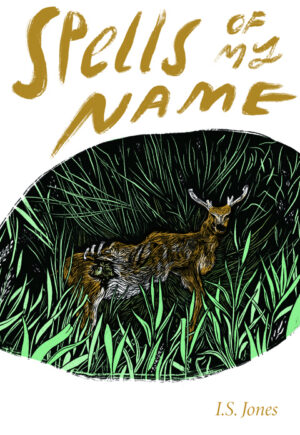
Spells of My Name
by I.S. Jones
In its title, this chapbook announces itself as incantation. As I cycle in and out of poems on sex and sexuality, violence and faith, nationality, and the other mazes through which we all work to define ourselves, I feel the collection unfurling like a tightly crafted spell. Through self-portrait poems and ones called “Interview with the American / Nigerian,” Jones navigates questions of identity and shows me how “[i]t’s exhausting to live in mistranslation.” Even when you know the words to say your spells, to announce yourself to the world, they perhaps fall from a “tongue that flexes toward what it knows best,” Jones writes in “Can You Speak Yorùbá.” Throughout the collection, she reminds me there are “ways to spell silence” as these poems move through erasure and speakers who acknowledge “[t]here are things we are too embarrassed to say.” Even still, in this small book, there is so much space Jones takes up as the speakers claim space for self, announcing in “Self-Portrait as Itolia”: “Future. i’m lonely, but at least i belong to myself.” The language reverberates in the next poem “Nexplanon”—“I am nearly 30 & I finally belong to myself.” The power of that echo, alongside the silence, is loud.
Purchase
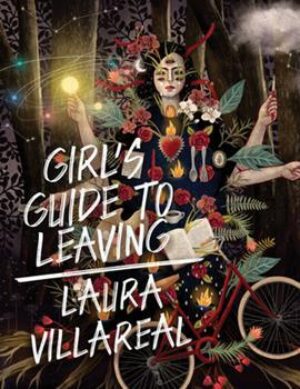
Girl’s Guide to Leaving
by Laura Villareal
I’ve read this collection in so many stages—as part of an application for a fellowship, in a chapbook, in manuscript form as I wrote a blurb. And now that Villareal’s Girl’s Guide to Leaving is in my hands in its final book form, I am still undone by the way it strikes me. I want stay in the worlds of these poems, and it’s not because I am comfortable in the landscape where bruises become “purple pansies” and “yellow galaxies.” It’s because I am drawn to the deft precision of the world Villareal builds in which our greatest and most personal griefs and traumas—tethered to violence, memory, and love—are presented with a patient attention to language and all-sense activated imagery. Lines like “the sardine smells like the holes / of my pierced ears” and “[m]y mother’s / brined sorrow was my first elixir for sleep” haunt because of their attentiveness. In this collection, there is the sense that the speakers are being made and unmade as they unspool their own myths, histories, and legends, as they grieve how “[h]ome is where I put my whole self away / in the garage or the attic or inside / a part of me I won’t visit soon.” The ligatures of moon and stars, grief and teeth, link this propulsive collection, which takes us into the depths of self while still offering us “pinholes of light.” On top of the language itself, the formal breadth of these poems reminds me that we are always moving, always leaving, even if I want to stay.
Purchase
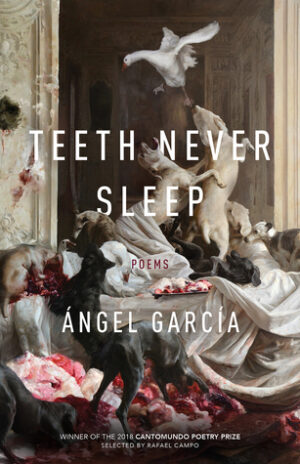
Teeth Never Sleep
by Ángel García
I probably return to Ángel García’s Teeth Never Sleep twice a year. I often return to it because I teach it, but I think I’d return to it regardless, for its fables, for its horrors, for its depth. It’s a collection that asks readers to sit with García in difficult conversations surrounding violence, toxic masculinity, and relationships. In it, García doesn’t look away from the bloody fragments of a child’s maimed arm, “the hollow pop of … fist against cheek,” the failures of those we love. And even as we arc toward growth in the collection, there is no easy redemption in this book. In its final pages, García writes “I don’t know who I am without fist or knuckle” and “I never wanted to be this kind of animal,” praying to not “bear the beasts not yet named.” Teeth Never Sleep unsettles me every time I read, but I value the discomfort of art to make me think deeper about things I might otherwise flatten. The tone and tenor of this book, its unflinching-ness, bring me back as much as the formal texture: the nimble line breaks and adroit imagery in poems like “Exuviae”; the well-paced unfolding of “Elegy to What Once Slept in a Cage”; the “El Esposo de la Llorona…” series that continues to evolve and build intimacy over the course of the collection.
Purchase
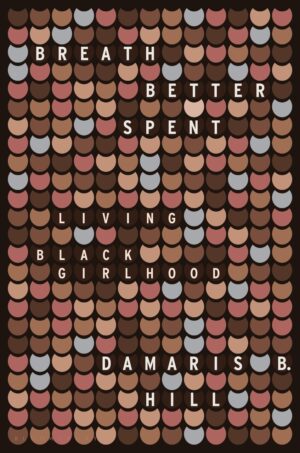
Breath Better Spent: Living Black Girlhood
by DaMaris B. Hill
Hill uses poetry and essay and photographs from both public and personal archives to create a book that manages both the ache of joy and heartbreak. The introduction alone is an invocation, a testimony, a kitchen table invitation to a book that links literary lineages, history, and pop culture icons with hallmarks of Black girlhood. These girls skip rope, bake cookies, and pretend to be heroes like Flo-Jo at the ’88 Olympics. These girls are “fat-cheeked dolls in the face” but also “born greedy / for something gritty on their lips.” I see myself among the girls here—my father, too, a military man who was “up to his boots in barrettes and Barbies” when he came home. I, too, was a girl on the brink of womanhood who would “beg for the blood.” Among the laughter and play in the girls of this collection, is a world that would rob them of their girlhood: “you will not have the words when he reaches for / you, the scars clawing after / you for the rest of your life.” These poems are elegy and celebration, proclamation and warning. Poems like “The Psalm of Teniya Jones” have me knee-bent in prayer while poems like “Grace for Be’la Dona” have me ready to dance. Hill demonstrates how “Black girls have a disposition for shape shifting” in this book that shapeshifts throughout.
Purchase


